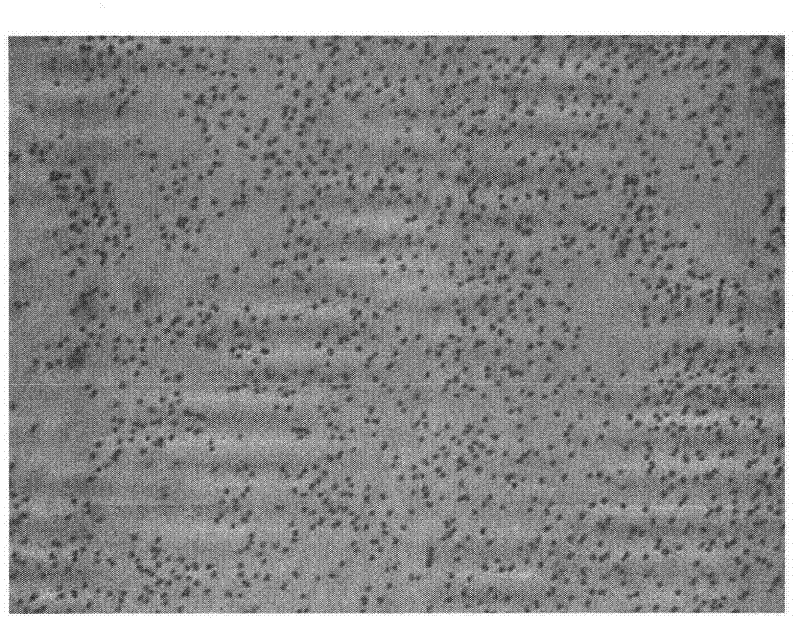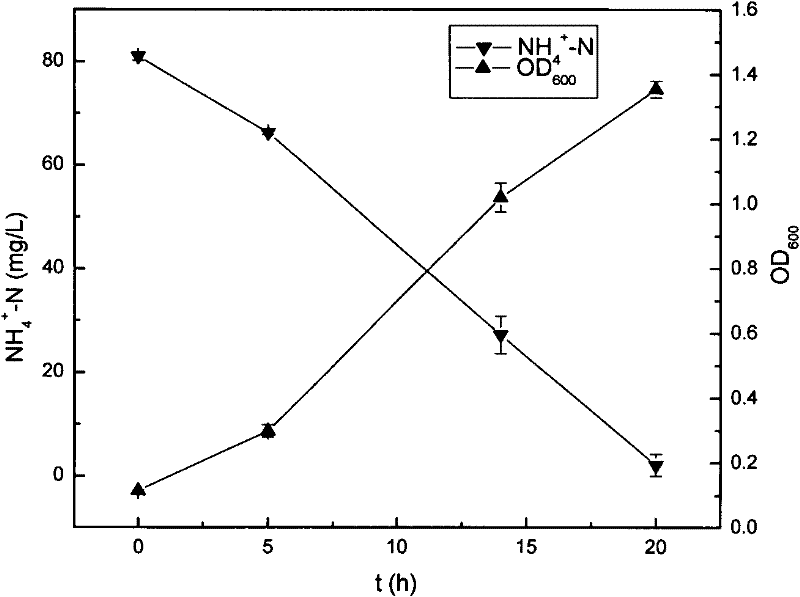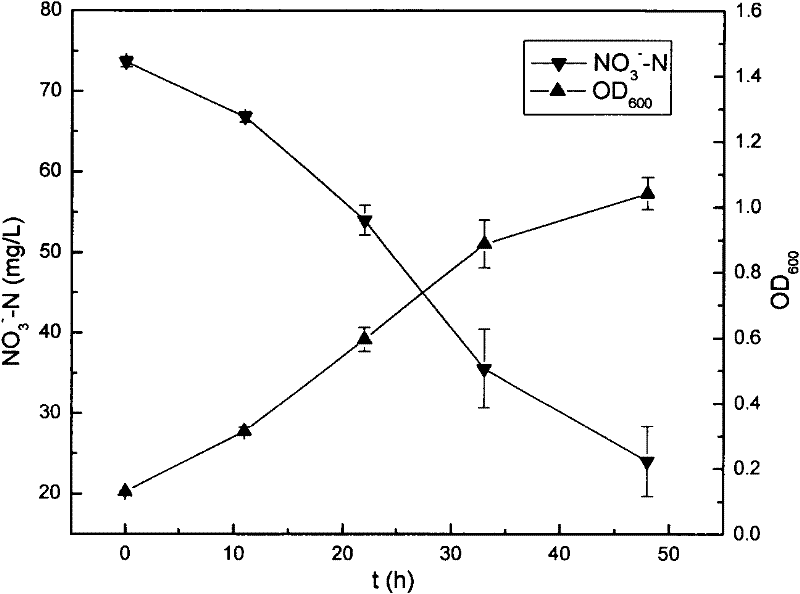Acinetobacter johnsonii strain for biological denitrification under low temperature and application thereof
A technology of Acinetobacter johnsonii and microbial strains, applied in the field of biological denitrification, can solve the problems such as the inability to effectively remove nitrate nitrogen and nitrite nitrogen, slow growth of autotrophic nitrifying bacteria, and difficulty in reaching the standard of total nitrogen in effluent, etc. Saving capital construction and operating costs, huge economic and environmental benefits, and effective removal
- Summary
- Abstract
- Description
- Claims
- Application Information
AI Technical Summary
Problems solved by technology
Method used
Image
Examples
Embodiment 1
[0037] Example 1. Screening of bacterial strain HA7 with low-temperature heterotrophic nitrification-aerobic denitrification performance
[0038] Specific steps are as follows:
[0039] 1) Take 10ml of sludge that has been domesticated and matured under low temperature conditions into a conical flask filled with 90ml of sterile water and sterilized glass beads, and vibrate on a shaker for 2 hours to fully break up the sludge;
[0040] 2) The crushed sludge was diluted to 10 by the ratio dilution method -1 、10 -2 ,..., 10- 6 For the bacterial suspension of each gradient, take the dilution as 10 -4 、10 -5 、10 -6 Each 0.1mL of the bacterial suspension was evenly spread on the medium containing BTB (sodium acetate per L: 2.73g, NH 4 Cl: 0.306g, KNO 3 : 1.0g, KH 2 PO 4 : 0.15g, MgSO 4 ·7H 2 O: 0.1g, FeSO 4 ·7H 2 O: 0.001g, L-aspartine: 1.0g, BTB (1% soluble in alcohol): 1ml, agar: 16-18g, pH: 7.0-7.3, steam sterilized at 121°C for 20min) on a 10ml solid plate;
[0041...
Embodiment 2
[0048] Example 2. Denitrification experiment of bacterial strains under low temperature conditions
[0049] 1. Biological denitrification experiment using ammonia nitrogen as nitrogen source
[0050] With sodium acetate as the organic carbon source and ammonia nitrogen as the nitrogen source, the removal ability of the bacterial strain HA7 described in Example 1 to ammonia nitrogen was determined. The specific implementation steps are as follows:
[0051] Bacterial strain HA7 is inoculated in the CMa medium of 150ml (every liter contains sodium acetate: 2.73g, NH 4 Cl: 0.306g, KH 2 PO 4 : 0.15g, MgSO 4 ·7H 2 O: 0.1g, FeSO 4 ·7H 2 O: 0.001g, pH: 7.0-7.3, steam sterilization at 121°C for 20 minutes), pre-cultivate on a shaker at 10°C, 160r / min. When the strain grows to the late logarithmic phase, take 10 ml of the bacterial liquid and put it into fresh 150 ml of CMa medium, and carry out shaking culture at 10°C and 160r / min. The reaction solution was taken at regular in...
Embodiment 3
[0057] Example 3. Denitrification experiments of bacterial strains under different temperature conditions
[0058] With sodium acetate as the organic carbon source and ammonia nitrogen as the nitrogen source, the removal ability of the bacterial strain HA7 described in Example 1 to ammonia nitrogen was measured at different temperatures. The specific implementation steps are as follows:
[0059] The strain HA7 was inoculated in 150 ml of CMa medium, and pre-cultured on a shaker at 10°C, 20°C, 30°C, 160r / min. When the strain grows to the late logarithmic phase, take 10ml of the bacterial liquid and put it into fresh 150ml CMa medium, and carry out shaking culture at 10°C, 20°C, 30°C and 160r / min respectively. The reaction solution was taken at regular intervals, and the optical density (OD) of the bacteria was measured. 600 ), centrifuge at 8000rpm for 10min, and take the supernatant to measure the concentration of various nitrogen-containing compounds.
[0060] The result i...
PUM
 Login to View More
Login to View More Abstract
Description
Claims
Application Information
 Login to View More
Login to View More - R&D
- Intellectual Property
- Life Sciences
- Materials
- Tech Scout
- Unparalleled Data Quality
- Higher Quality Content
- 60% Fewer Hallucinations
Browse by: Latest US Patents, China's latest patents, Technical Efficacy Thesaurus, Application Domain, Technology Topic, Popular Technical Reports.
© 2025 PatSnap. All rights reserved.Legal|Privacy policy|Modern Slavery Act Transparency Statement|Sitemap|About US| Contact US: help@patsnap.com



